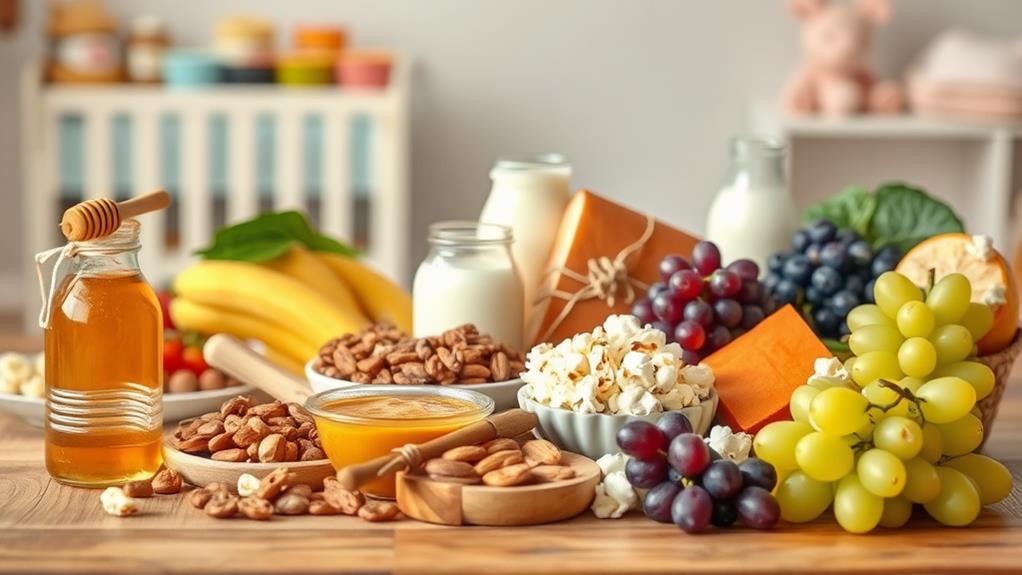When you're caring for a baby under one year old, it's essential to be aware of certain foods that could pose risks to their health and safety. You might be surprised to learn that common items like honey and cow's milk aren't suitable for their delicate systems. Additionally, there are other foods that present choking hazards or could lead to allergic reactions. Understanding what to avoid can be vital for your child's well-being, but you may wonder what safe alternatives exist and how to navigate this challenging landscape.
Honey
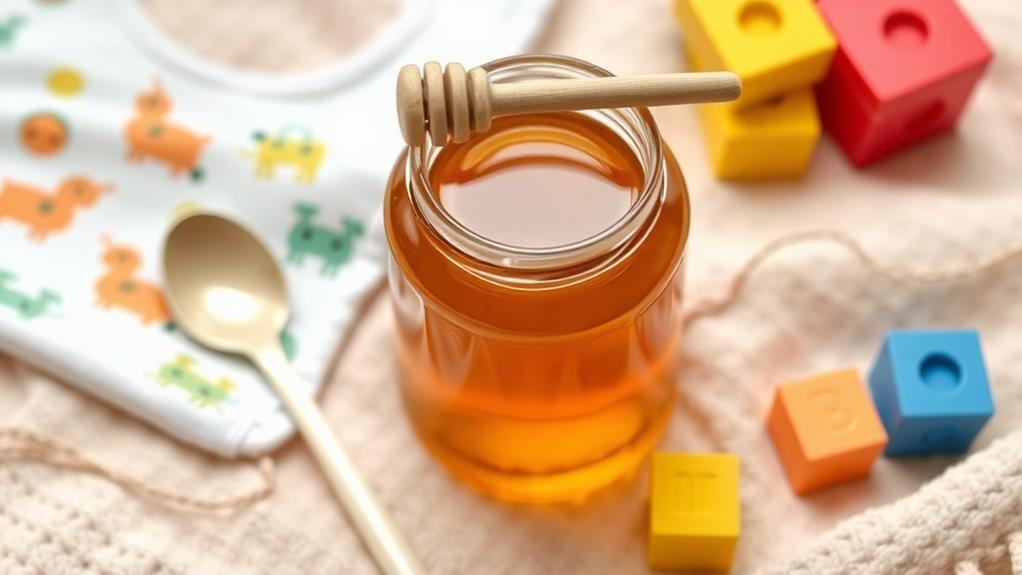
When it comes to feeding your baby, honey is a no-go before their first birthday. You might think honey is a natural, sweet treat, but it can pose serious health risks for infants. The main concern is botulism, a rare but potentially life-threatening illness caused by bacteria that can thrive in honey.
Babies' digestive systems aren't fully developed, making them more vulnerable to these bacteria. Even a tiny amount of honey can be dangerous for your little one.
Most parents don't realize that honey can be found in various foods, like baked goods or commercial baby food, so always check labels before giving anything new. It's best to stick to safe options like fruits, vegetables, and grains for your baby's meals until they turn one.
After their first birthday, you can introduce honey into their diet, and they can enjoy its sweetness without the worry. Until then, focus on providing a balanced diet that supports their growth and development.
Cow's Milk
Many parents wonder about introducing cow's milk to their baby's diet, but it's crucial to wait until after their first birthday. Cow's milk isn't recommended for infants under one year because it doesn't provide the right balance of nutrients that your baby needs at this stage. Instead, breast milk or formula offers the essential vitamins and minerals that promote healthy growth.
When you introduce cow's milk too early, your baby might miss out on iron, leading to deficiencies. Cow's milk can also be hard on your baby's delicate digestive system. It may cause issues like tummy upset or even allergies in some cases.
Once your little one turns one, you can gradually start incorporating whole cow's milk into their diet. It's important to focus on whole milk, as it contains the necessary fats for brain development.
Remember to monitor how your baby reacts to the new addition.
Nuts and Nut Butters
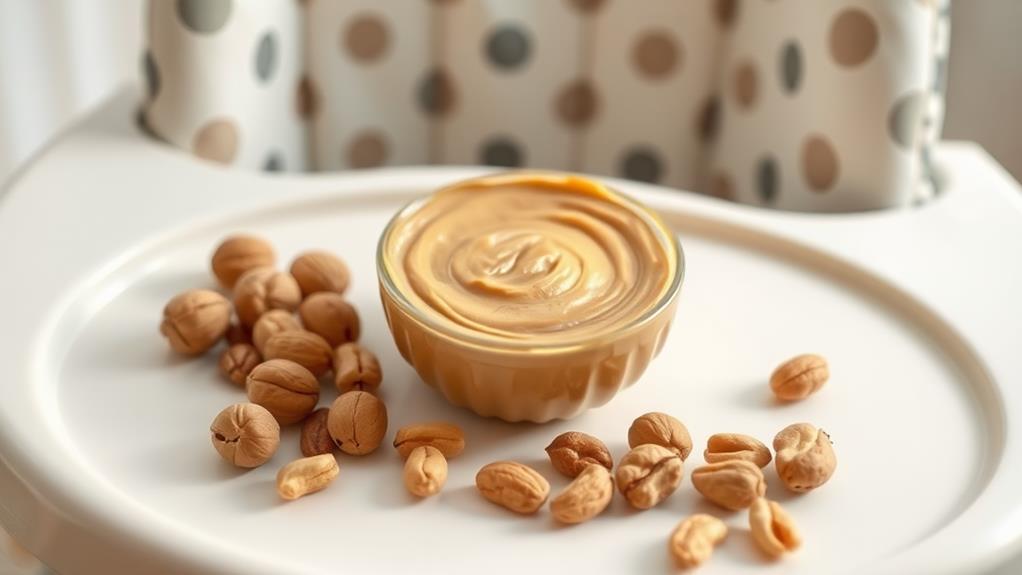
Avoiding nuts and nut butters in your baby's diet before their first birthday is essential for their safety. While nuts can be a healthy snack for older kids and adults, they pose a significant choking hazard for babies. Their hard texture can easily block your little one's airway, leading to dangerous situations.
Additionally, nuts are among the top allergens for infants. Introducing them too early could result in severe allergic reactions, which might include hives, swelling, or even more serious complications. It's crucial to wait until your baby turns one before incorporating nuts or nut butters into their meals.
If you're eager to introduce new flavors to your baby's diet, consider other safe options like pureed fruits or vegetables. These choices aren't only nutritious but also less risky.
Once your child reaches that magical one-year mark, you can gradually introduce nuts and nut butters, starting with small amounts and keeping a close watch for any reactions.
Whole Grapes
Because whole grapes are small and round, they can easily pose a choking hazard for babies under one year old. It's essential to be cautious when introducing solid foods to your little one, and grapes are a common item to avoid. While they're healthy and packed with nutrients, their shape and size make them risky for infants who may not have developed the ability to chew properly yet.
If you want to offer grapes to your baby later on, consider cutting them into smaller pieces. Halving or even quartering grapes can significantly reduce the risk of choking, making them safer for toddlers. Remember, it isn't just about the size; the texture can also be a concern. Grapes can be slippery, which makes it even harder for your baby to grasp and chew them effectively.
In the meantime, you might want to explore other fruit options that are safer for your infant. Soft fruits like bananas or cooked apples are great choices. They're easy to mash and swallow, providing your baby with essential vitamins and a delightful taste experience.
Always prioritize safety as you navigate your baby's food journey!
Choking Hazards
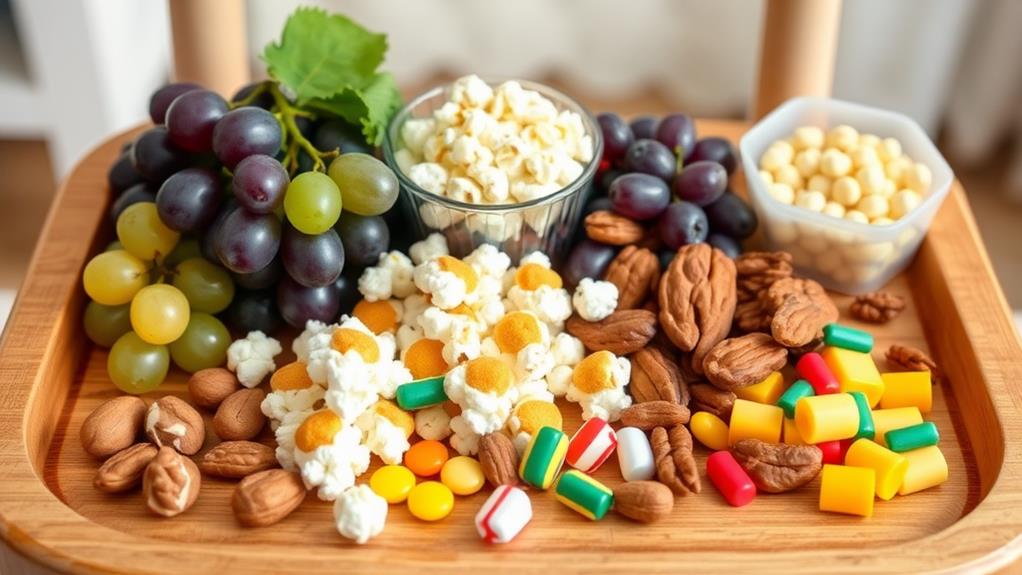
Choking hazards are a significant concern when introducing solid foods to babies under one year old. As a parent or caregiver, it's crucial to understand which foods can pose a risk. Babies have small airways, and their chewing ability is still developing, making them more susceptible to choking.
First, avoid hard foods like whole nuts, popcorn, and raw vegetables. These items can easily get lodged in their throats. Instead, opt for soft, well-cooked vegetables that are easy to mash.
Additionally, small, round foods such as whole grapes, cherry tomatoes, and berries can also be dangerous. Always cut these into smaller, manageable pieces to reduce the risk.
Sticky foods like peanut butter can stick to the roof of a baby's mouth, creating a choking hazard as well. If you do offer nut butters, spread them thinly on toast or mix them into purees.
Lastly, avoid foods that are tough or chewy, such as beef jerky or hard candies. Remember, your vigilance in selecting appropriate foods will help keep your little one safe during mealtime.
Always supervise your baby while eating, and stay calm—you're doing a great job!
Raw or Undercooked Eggs
Why take the risk with raw or undercooked eggs when your baby's health is at stake? These eggs can carry harmful bacteria like Salmonella, which can lead to serious illness.
Your little one's immune system isn't fully developed yet, making them more vulnerable. Even a small amount of bacteria can cause gastrointestinal distress, fever, or worse.
Cooking eggs thoroughly is essential. This means no runny yolks or lightly cooked whites. When eggs are fully cooked, the heat kills any dangerous bacteria, ensuring they're safe for your baby.
You might think that scrambled eggs or an omelet are harmless, but if they're undercooked, they pose a risk.
If you're looking for ways to introduce eggs into your baby's diet, opt for well-cooked options. You can try hard-boiled eggs, where both the yolk and white are firm, or scrambled eggs cooked until they're no longer runny.
Always remember, it's better to be safe than sorry. Keeping your baby healthy is what matters most, and avoiding raw or undercooked eggs is a simple step you can take to protect them.
Your careful choices help set the foundation for a strong and healthy future.
Fish High in Mercury
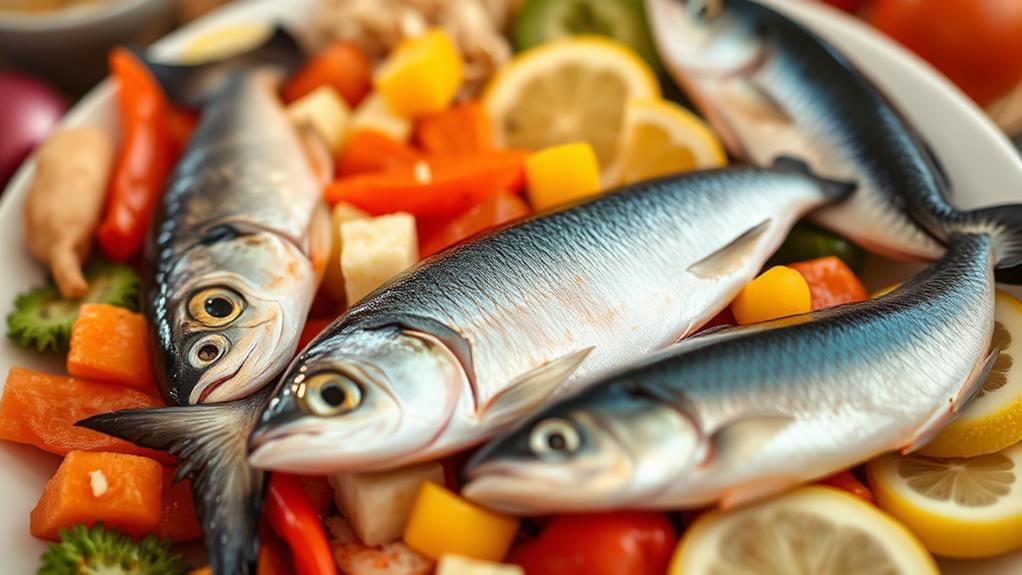
Fish can be a nutritious part of your baby's diet, but certain types should be avoided due to high mercury levels. Mercury is a toxic metal that can harm your baby's developing nervous system and brain. You want to be cautious about which fish you choose for your little one.
Fish like shark, swordfish, king mackerel, and tilefish have the highest mercury levels and should be completely avoided. Instead, opt for safer options like salmon, catfish, or tilapia, which contain lower mercury levels and can provide beneficial nutrients like omega-3 fatty acids.
When introducing fish to your baby, it's best to do so in small amounts and watch for any allergic reactions. You can start with well-cooked, flaked fish, making sure it's free from bones.
Always consult your pediatrician before introducing new foods, especially fish, to ensure it's appropriate for your baby's age and health.
Unpasteurized Dairy Products
When it comes to your baby's diet, unpasteurized dairy products are another category to avoid. These products include raw milk and cheeses made from unpasteurized milk.
You might be wondering why these items are off-limits. The main concern is safety. Unpasteurized dairy can harbor harmful bacteria like E. coli, Salmonella, and Listeria, which can lead to serious health issues, especially for infants whose immune systems are still developing.
While cheese and milk can be nutritious, it's crucial to stick with pasteurized options for your little one.
Pasteurization is a process that heats the milk to kill harmful bacteria without compromising its nutritional value. By choosing pasteurized dairy, you're giving your baby the benefits of dairy, such as calcium and protein, without the increased risk of foodborne illnesses.
Processed Sugary Foods
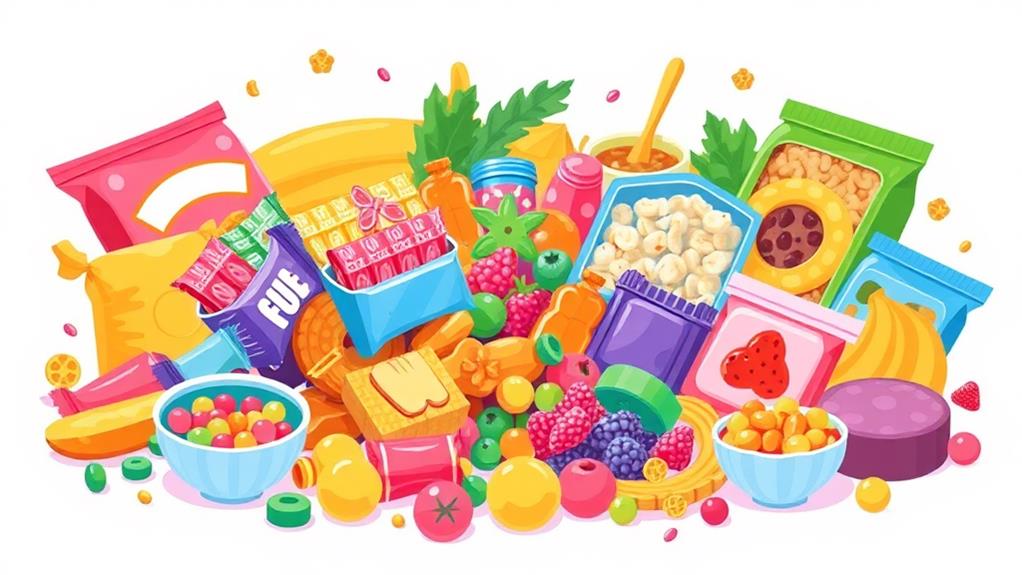
Many parents mightn't realize how harmful processed sugary foods can be for babies under one year old. These foods are often packed with added sugars and unhealthy ingredients that can lead to a host of problems.
For starters, consuming too much sugar can increase the risk of tooth decay, even in infants. Their tiny teeth are still developing, and sugary snacks can wreak havoc on their oral health.
Additionally, processed sugary foods can interfere with your baby's appetite. If they're filling up on cookies or sugary cereals, they mightn't want to eat nutritious foods that support their growth and development. It's essential to establish healthy eating habits early on, and sugary snacks can set a poor precedent.
Moreover, excessive sugar intake in babies can lead to weight gain and increase the risk of obesity later in life.
Instead of reaching for processed goodies, focus on whole foods like fruits, vegetables, and whole grains. These options won't only satisfy their taste buds but also provide essential nutrients.
Salt
Your baby's tiny body is still developing, making it crucial to be mindful of salt intake. Babies under one year old have kidneys that aren't fully mature, which means they can't process excess sodium well. Too much salt can lead to dehydration and put unnecessary strain on those little kidneys. Since babies get all the sodium they need from breast milk or formula, there's no need to add salt to their meals.
When you prepare food for your baby, stick to fresh fruits, vegetables, and whole grains without any added salt. Processed foods often contain hidden sodium, so it's best to limit those or avoid them altogether. Even seemingly healthy options like baby snacks or canned vegetables can have more salt than you'd expect.
You might think a little salt can enhance flavor, but your baby's taste buds are still developing, and they won't miss it. Instead, focus on offering a variety of natural flavors through herbs and spices appropriate for their age.
Citrus Fruits
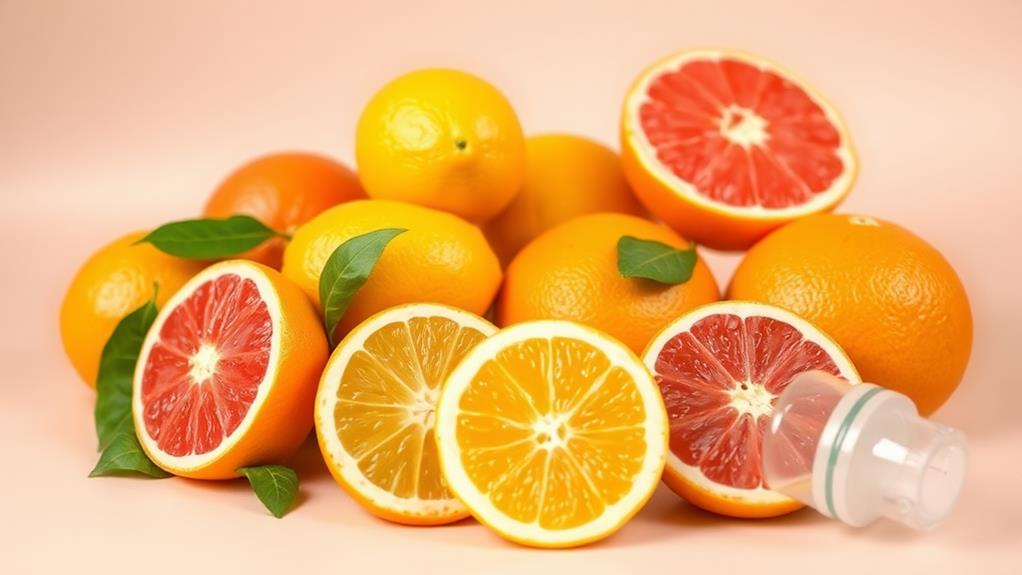
Citrus fruits, while packed with vitamins and nutrients, aren't the best choice for babies under one year old. These fruits, like oranges, lemons, and grapefruits, can be quite acidic, which might irritate your baby's delicate stomach. This acidity can lead to discomfort, and you don't want your little one crying because of tummy troubles.
Furthermore, introducing citrus fruits too early might increase the risk of allergies. Babies' immune systems are still developing, and exposing them to potential allergens at a young age can lead to issues down the line. It's better to wait until after their first birthday before introducing citrus fruits into their diet.
If you're looking for safe fruit options for your baby, consider softer choices like bananas, pears, or cooked apples. These fruits are generally easier on their stomachs and provide essential nutrients without the potential discomfort that comes from citrus.
Once your baby is older and their digestive system is more mature, you can gradually introduce citrus fruits. But for now, it's wise to hold off and stick with gentler, baby-friendly options. You'll be helping your little one enjoy food without any unnecessary fuss!
Spicy Foods
Generally, it's best to avoid spicy foods for babies under one year old. Babies have sensitive digestive systems that aren't ready to handle the heat found in spices. Introducing spicy flavors too early can lead to discomfort, tummy troubles, or even allergies.
You might think it's fun to share your favorite spicy dish, but remember, your little one's taste buds are still developing. Instead, focus on mild flavors that are easier for them to digest. Foods like pureed vegetables, fruits, and grains are great options. They'll help your baby enjoy mealtime without the risk of irritation.
As your baby grows and starts to explore different foods, you can gradually introduce more complex flavors, but spicy foods should wait until at least their second birthday.
Always pay attention to how your baby reacts to new foods. If they seem fussy or uncomfortable after trying something spicy, it's a sign to hold off for a while longer. Keeping meals simple and soothing will ensure your baby has a positive eating experience.
Caffeinated Beverages

Caffeinated beverages are a definite no-no for babies under one year old. You might think a little caffeine won't hurt, but it can actually lead to some serious issues for your little one. Babies' bodies are still developing, and they can't metabolize caffeine like adults can. This can affect their sleep patterns, making it tough for them to get the rest they need.
Moreover, caffeine can lead to irritability and hyperactivity, which isn't ideal for a growing baby. You don't want to see your child bouncing off the walls at bedtime, right?
It's also important to remember that caffeine can be found in more than just coffee; sodas, energy drinks, and even some teas contain it too.
Giving your baby caffeinated drinks can also interfere with their appetite. When babies fill up on these sugary, caffeinated options, they may not be as interested in nutritious foods, which are crucial for their growth and development.
Artificial Sweeteners
When it comes to feeding your baby, steering clear of artificial sweeteners is crucial. These sweeteners, like aspartame and sucralose, are often found in diet foods and drinks. While they may seem harmless, they're not suitable for little ones. Babies' bodies are still developing, and their reactions to these chemicals can be unpredictable.
Research suggests that consuming artificial sweeteners could interfere with their taste preferences and lead to unhealthy eating habits later in life. You want your baby to enjoy natural flavors, fostering a love for wholesome foods.
Plus, the long-term effects of artificial sweeteners are still not fully understood, making it best to avoid them altogether for now. Instead of reaching for products containing these sweeteners, focus on providing your baby with naturally sweet foods like fruits.
Bananas, apples, and pears can serve as delicious, nutritious alternatives. Remember, your baby's health is your top priority, and choosing whole, unprocessed foods sets a strong foundation for their future.
Foods With Added Sugar
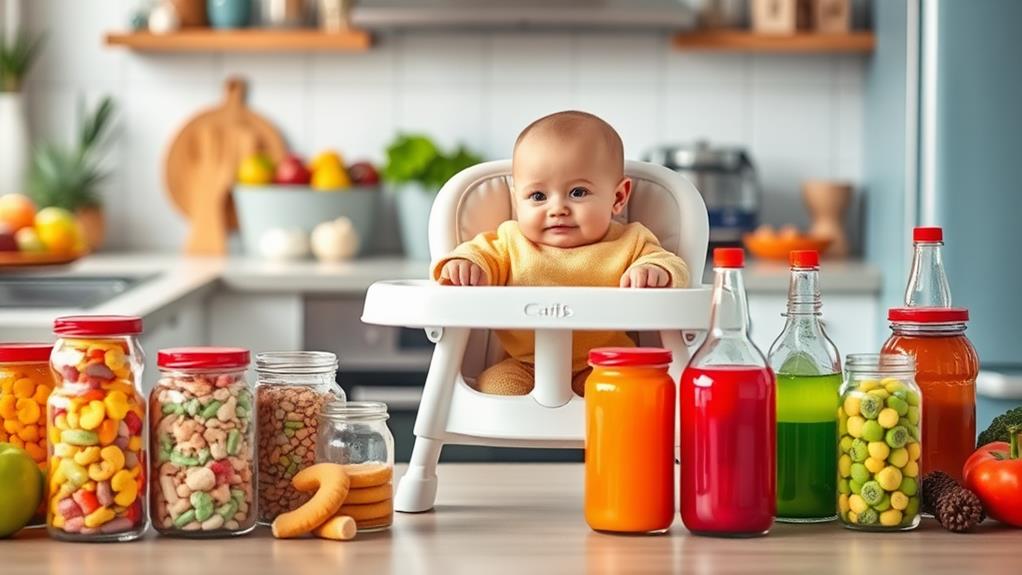
Added sugar is a common ingredient in many processed foods, and it's best to keep it away from your baby's diet. Babies have delicate systems, and introducing added sugars can lead to health issues like tooth decay and poor eating habits later on.
When you give your little one sugary foods, it can also replace the essential nutrients they need for healthy growth. You might think fruit juices or flavored yogurts are harmless, but many are packed with added sugars.
Instead, opt for whole fruits and plain yogurt, which provide natural sweetness and important vitamins without the extra sugar. Reading labels is crucial; check for ingredients like high fructose corn syrup or cane sugar, and steer clear of products that list these as main components.
It's worth noting that babies don't need added sugars for energy. Their bodies thrive on natural sources of carbohydrates, like fruits and vegetables.
